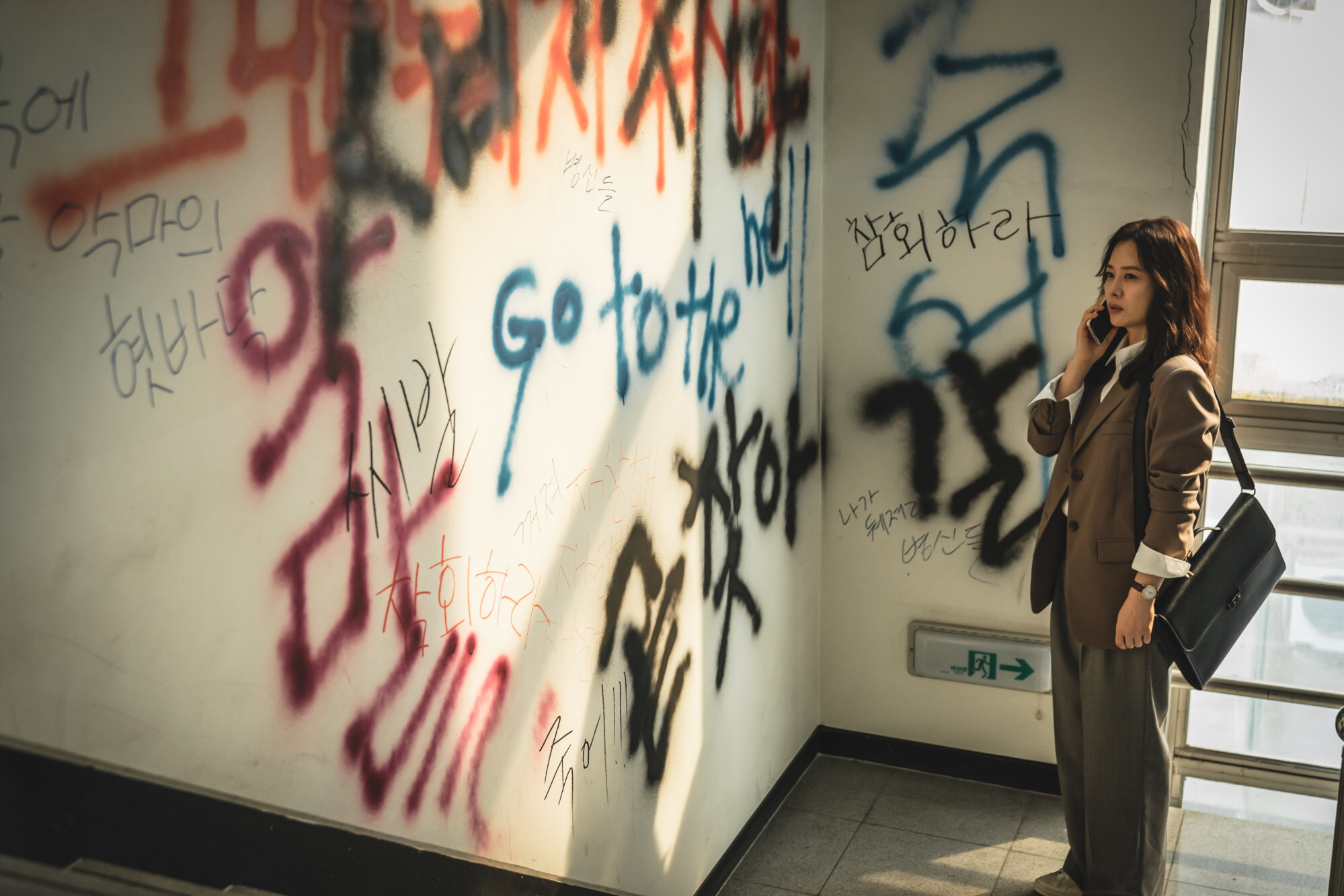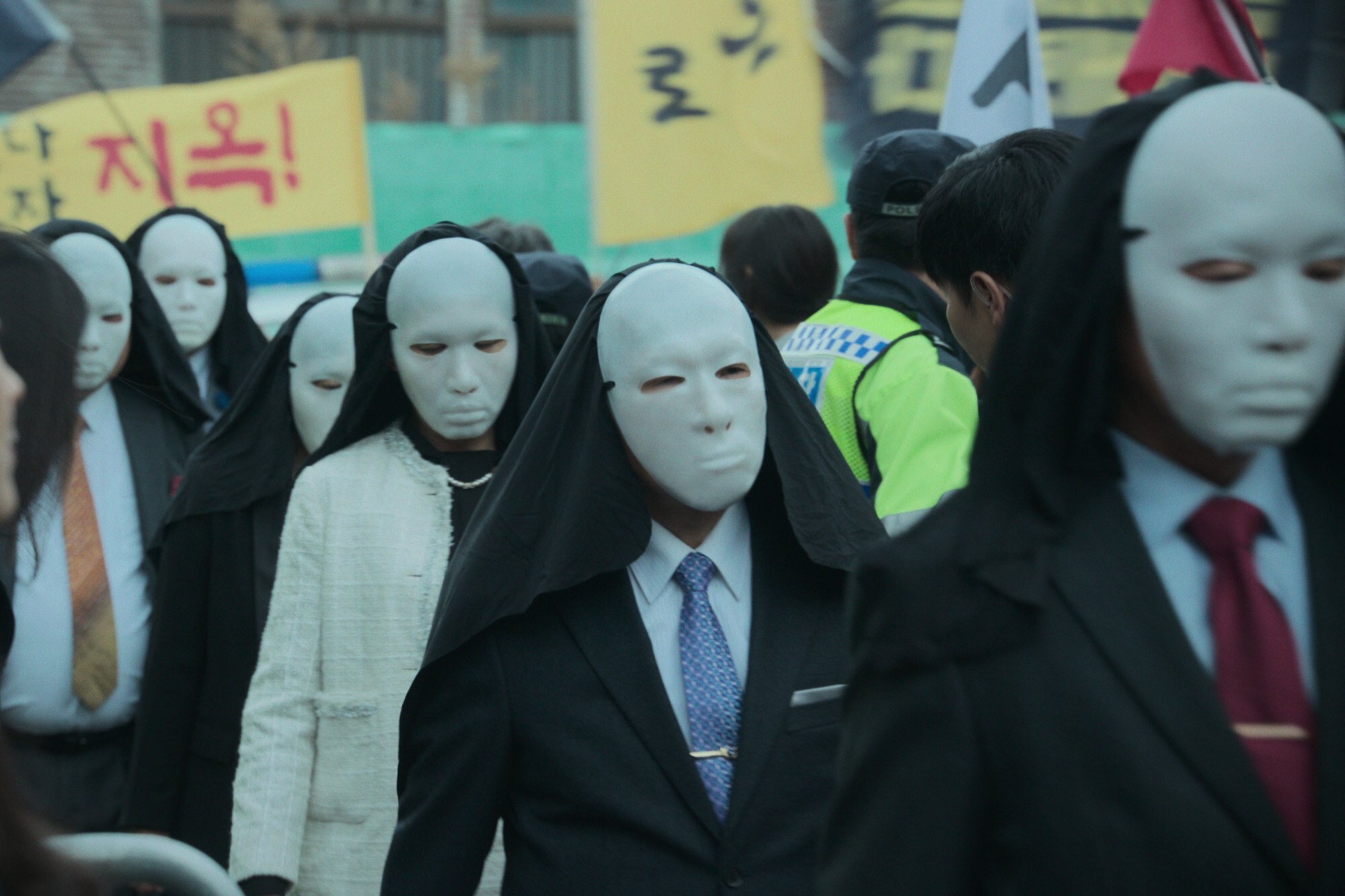
Review | K-drama review: Hellbound – in Netflix’s transfixing and endlessly surprising dystopia, directed by Train to Busan’s Yeon Sang-ho, everyone is pitted against each other
- This six-part series from the director of Train to Busan based on a web comic is dark and utterly riveting. Yoo Ah-in plays the leader of a religious sect
- Massive plot twists, impressive set pieces, urgent pacing and a unique narrative structure make Hellbound a winner. Even better, it sets up a second season
This article contains mild spoilers.
4.5/5 stars
After well-received preview shows at major film festivals around the world this autumn, Netflix has launched in its entirety its latest Korean Original series, Yeon Sang-ho’s dark and transfixing six-part Hellbound.
The series, based on a web comic of the same name he co-wrote, shows us a world in the midst of major change. An unexplained phenomenon – a grey face that hangs in the air within a plume of grey smoke – has begun to appear in front of random people around the world, pronouncing to them in an aspirated voice that they will die at a specific moment in the future.
It could be mere seconds or it could also be long and agonising years, but when the appointed time arrives three muscle-bound grey smoke monsters emerge from nothingness and make a beeline for their targets, savagely pummeling them and subjecting them to a white beam of light that leaves behind nothing but a charred skull and rib cage.
Amid this chaos and confusion arises the New Truth Society, a religious sect that has documented these acts around the world and calls them the result of humanity’s sins. When a case occurs in Seoul and is filmed by bystanders, a murder investigation is launched, but the police in charge, including Detective Jin Kyung-hoon (Yang Ik-joon), are baffled.
They approach Jung Jin-soo (Yoo Ah-in), the leader of the New Truth Society, but their case takes on a much broader dimension when a woman comes forward after having received one of these pronouncements.
The New Truth Society wants to broadcast the moment of her death and Kyung-hoon teams up with lawyer Min Hye-jin (Kim Hyun-joo) to protect the woman and her family when a collective religious hysteria starts to sweep the nation.
Hellbound possesses a unique narrative structure, but to explain it may ruin some of the surprise, so take this as a mild spoiler warning for the next three paragraphs.

The show is split into two time periods a few years apart with different casts – though there are several crossover characters. The first part, as explained above, focuses on a society contending with existential change, while the second half takes place in a world already changed.
After jumping ahead several years we are introduced to Bae Young-jae (Park Jung-min), a cynical TV producer frustrated by the oversight of the New Truth Society, which now wields enormous national influence. Young-jae’s wife, Song So-hyun (Won Jin-A), has just given birth, and in the hospital intensive care unit she sees the dreaded apparition pronounce her newborn baby’s forthcoming demise.
Meanwhile, Young-jae goes looking for a missing colleague, which leads him to discover a group that tries to cover up these monster attacks so that the bereaved family members of the victims won’t be stigmatised by New Truth devotees, or members of the fascistic Arrowhead organisation.

Viewers around the world can’t get enough of dystopian content, screen stories that allegorise the rampant inequity of the troubled times we live in.
Not all of these tales are intended to be rich social commentaries – the aesthetic and narrative possibilities of a dystopian backdrop are reason enough to tell a story, but the best dystopias are those that latch on to contemporary social ills. Hulu’s timely The Handmaid’s Tale, arriving a few months before the #MeToo movement kicked off, was one such example.
Yet while this kind of content has dominated airwaves this year, the majority of Korea’s small-screen dystopian stories have been superficial. As is the norm in K-dramas, corporations or influence-wielding shadow groups have been to blame for the worlds in these shows falling into chaos, but the black-and-white treatment of corruption therein has largely elided the manifold complexities of social inequality.
Yeon Sang-ho, the visionary behind Train to Busan who makes his drama series debut with Hellbound, offers us an alternate universe shrouded in grey, a veritable moral morass that implicates every single living and breathing cog within it.

Heavy though that may sound – and the series has a matching dark aesthetic to boot – Yeon injects his own brand of levity into the mix, often in characters’ exasperated incredulity at what is unfolding.

Hellbound will start streaming on Netflix on November 19.

